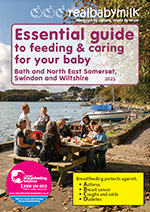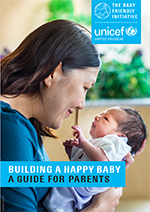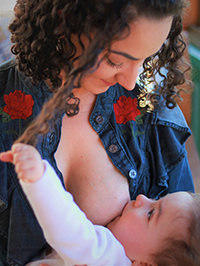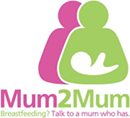Maternity
Infant Feeding Specialist / Tongue Tie
Feeding and Caring for your baby
In pregnancy
Your midwifery care in pregnancy will include several conversations about feeding and caring for your baby after birth so that you feel well prepared and have a chance to ask questions you have. Your midwife will also signpost you to several sources of information we recommend including the Real Baby Milk leaflet available to expectant and new parents across the Bath, Swindon and Salisbury Local Maternity System.
 Essential guide to feeding & caring for your baby |
 Building a happy baby - a guide for parents |
|||

After birth
Support for feeding and caring for your baby is an important part of postnatal care and it will be tailored to each mother's and baby's needs.
Again there will be time for conversation about these topics ensuring that you grow in confidence over the time of your postnatal care.
Specialist Support
Occasionally mothers and babies need some extra support and this is also available. Your midwife will refer you to the Specialist Infant Feeding team. They will contact you by phone to discuss your needs and how they can be met.
Tongue tie assessment and division service
If you and your baby are experiencing feeding difficulties that are not resolving and a tongue tie is suspected you will be referred into the service. The Infant Feeding Specialist will contact you by phone, discuss your situation and offer you an appointment for assessment if you need one. Usually within 1 week of referral.
If you think you have been referred but have not heard from us within 3 working days then please email ruh-tr.infantfeeding@nhs.net
Mum2Mum Breastfeeding Peer Support
 Breastfeeding Peer Supporters are mothers who have breastfed themselves and who (after training) offer support to other mothers as volunteers. They work in a variety of setting including on Mary Ward at the Royal United Hospital, in Children's Centres in Wiltshire and on line.
Breastfeeding Peer Supporters are mothers who have breastfed themselves and who (after training) offer support to other mothers as volunteers. They work in a variety of setting including on Mary Ward at the Royal United Hospital, in Children's Centres in Wiltshire and on line.
Contact them on Facebook in pregnancy or after birth:
Bath & West Wiltshire Breastfeeding Peer Support
Formula feeding of babies
If you are feeding your baby with baby formula milk it is important that formula milk is prepared as directed on the manufacturer's instructions and is not watered down as this will result in your baby not receiving the adequate nutrients required for health.
It is also important that the correct stage baby milk is used for your baby eg. First Infant formula (Stage 1 milk). Follow on formula milk should never be used for babies under 6 months and they can continue to have First Milk up the age of one year as part of their diet.
If you have any problems obtaining formula milk, try shopping around smaller shops if you can't find it in your usual supermarket. The manufacturers are still distributing regular supplies to shops and increasing production.
Find out more here:
Bottle Feeding - Start for Life
RUH Patient Information
When breastfeeding gets off to a slow start
Infant Feeding Support Videos
Human Milk, Tailor-made for Tiny Humans
Baby Friendly Initiative
Meeting baby for the first time

